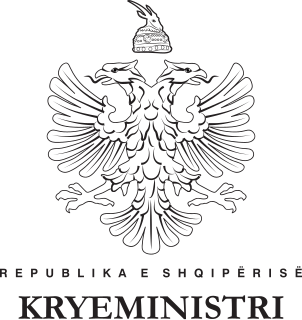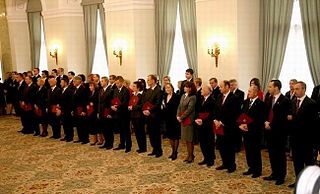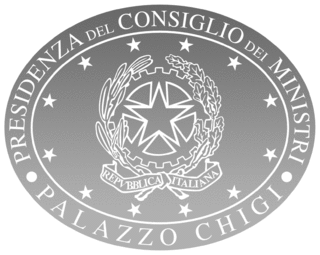
A prime minister is the head of a cabinet and the leader of the ministers in the executive branch of government, often in a parliamentary or semi-presidential system. A prime minister is not a head of state or chief executive officer of their respective nation, rather they are a head of government, serving typically under a monarch in a hybrid of aristocratic and democratic government forms.
The president is a common title for the head of state in most republics. In politics, president is a title given to leaders of republican states.
Head of government is a generic term used for either the highest or second highest official in the executive branch of a sovereign state, a federated state, or a self-governing colony, who often presides over a cabinet, a group of ministers or secretaries who lead executive departments. The term "head of government" is often differentiated from the term "head of state", as they may be separate positions, individuals, or roles depending on the country.
Premier is a title for the head of government in some countries, states and sub-national governments. A second in command to a premier is designated as a vice-premier or deputy premier.

The Prime Minister of Iraq is the head of government of Iraq. The Prime Minister was originally an appointed office, subsidiary to the head of state, and the nominal leader of the Iraqi parliament. Under the newly adopted constitution the Prime Minister is the country's active executive authority. Nouri al-Maliki was selected to be Prime Minister on 21 April 2006. On 14 August 2014, al-Maliki agreed to step down as prime minister of Iraq to allow Haider al-Abadi to take his place. On 25 October 2018, Adil Abdul-Mahdi was sworn into office five months after the 2018 elections.

The French Prime Minister in the Fifth Republic is the head of government. During the Third and Fourth Republics, the head of government position was called President of the Council of Ministers, generally shortened to President of the Council.

The Prime Minister of Albania, officially styled the Prime Minister of the Republic of Albania, is the head of government of the Republic of Albania and as well the most powerful and influential person in Albanian politics. The Prime Minister holds the executive power of the nation and represents the Council of Ministers and chairs its meetings.

The Chairman of the Government of the Russian Federation, colloquially referred to as the Prime Minister is the head of the Russian government and the second most powerful figure of the Russian Federation. The official residence of the prime minister is Gorki-9 in Odintsovsky District, Moscow Oblast, but his working residence is in Moscow. Under Article 24 of the Federal Constitutional Law 'On the Government of the Russian Federation', the prime minister "heads the Government of the Russian Federation". The Russian Prime Minister is considered the second highest position in the government, after the President.

The Prime Minister of Lebanon, officially the President of the Council of Ministers, is the head of government and the head of the Council of Ministers. The Prime Minister is appointed by the President of Lebanon, with no confirmation needed from the Parliament of Lebanon. By convention, he is always a Sunni Muslim.

The Prime Minister of Serbia, officially the President of the Government of the Republic of Serbia, is the head of the Government of Serbia. The role of the Prime Minister is to direct the work of the Government, and to submit to the National Assembly the Government's Program, including a list of proposed ministers. The resignation of the Prime Minister will cause the fall of the Government.
The Union Council of Ministers exercises executive authority in the Republic of India. It consists of senior ministers, called 'cabinet ministers', junior ministers, called 'ministers of state' and, rarely, deputy ministers.

The President of the Council of Ministers of Peru, informally called "Premier" or "Prime Minister", heads the Council of Ministers, and is appointed by the President.

The Council of Ministers of the Republic of Poland is the collective executive decision-making body of the Polish government. The cabinet consists of the Prime Minister, also known as the President of the Council of Ministers, the Deputy Prime Minister, who acts as a vice-president of the council, and other ministers. The current competences and procedures of the cabinet are described between Articles 146 to 162 of the constitution.

The cabinet of Greece, officially called the Ministerial Council, constitutes the Government of Greece. It is the collective decision-making body of the Hellenic Republic, composed of the Prime Minister and the Ministers. One or more Ministers may be appointed Vice President of the Government, by decree initiated by the Prime Minister. Ministers are appointed by the President on the advice of the Prime Minister.

The Government of the French Republic exercises executive power in France. It is composed of the Prime Minister, who is the head of government, and both junior and senior ministers. Senior ministers are titled as Ministers, whereas junior ministers are titled as Secretaries of State. A smaller and more powerful executive body, called the Council of Ministers, is composed only of the senior ministers, though some Secretaries of State may attend Council meetings. The Council of Ministers is chaired by the President of the Republic, unlike the government, but is still led by the Prime Minister, who was officially titled as the President of the Council of Ministers during the Third and Fourth Republics.

The Prime Minister of the Kingdom of Cambodia is the head of government of Cambodia. The prime minister is also the chairman of the Cabinet and leads the executive branch of the Royal Cambodian Government. The prime minister is required to be a member of parliament, and is appointed by the monarch for a term of five years. Since 1945, 36 individuals have served as prime minister.

The Prime Minister of Cuba, known as the President of the Council of Ministers between 1976 and 2019, is the head of the Council of Ministers of Cuba.

The Government of Russia exercises executive power in the Russian Federation. The members of the government are the Prime Minister, the deputy prime ministers, and the federal ministers. It has its legal basis in the Constitution of the Russian Federation and the federal constitutional law "On the Government the Russian Federation".

The Council of Ministers is the principal executive organ of the Government of Italy. It comprises the President of the Council, all the ministers, and the undersecretary to the President of the Council. Deputy ministers and junior ministers are part of the government, but are not members of the Council of Ministers.














